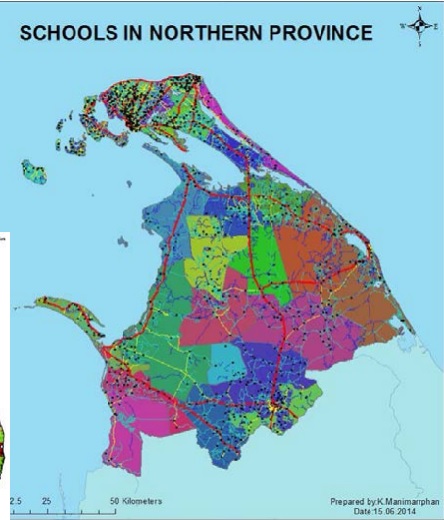Provincial Dept. of Education – Northern Province
 Executive Summary
Executive Summary
The Northern Education System Review (NESR) was conceived by the newly elected Hon. Minister of Education, Cultural Affairs, Sports and Youth Affairs Mr. Thambirajah Gurukularajah soon after the election of the first Provincial Government of the North. He invited all the senior members of the Provincial Ministry Education in mid-October 2013 and announced the NESR to assess the present situation with a view to improving the education system to serve the children as best as it
could.
He called for his staff to form a Steering Committee and proceed with the review with the Hon. Minister as Chairman assisted by the Secretary of the Ministry of Education Mr. S. Sathiyaseelan and the Provincial Director of Education Mr. S. Selvarasa. He announced to the staff that Dr. Nagalingam Ethirveerasingm will facilitate the process and chair all the working meetings. A
Secretariat composed of the facilitator, a secretary, two ICT staff, and two trainee staff was created to coordinate the review.
The formation of the Steering Committee, the subcommittees, and the guidelines of the process of the review are described in Chapter 1.
Over 400 persons from all walks of life, from auto-rickshaw drivers to professors in education, from farmers to the Sri Lankan Minister of Education assisted and contributed at all levels of this process.
The subject group leaders of the Steering Committee gathered information and investigated the processes of the Education System from students to the administrators. The Minister (Northern Province), the facilitator, and group leaders had direct interviews with students, teachers and parents on issues that were of concern to them and made note of their recommendations to improve the functioning of the system. The summary of all information contributed by the public and other stakeholders as well as that gathered directly by the reviewers are presented in Appendix I.
The illustration in Figure ES 1 shows the current situation in the Northern Education System and proposed improvements. The prominence of the ‘black branch’ rising out from the ‘Student Learning and Growth’ central node/cloud upwards to ‘National Exams’ and the tentacles descending from there to control all the other aspects that influence, feedback, or otherwise affect
‘Student Learning and Growth’ – from teachers and teaching methods to parents and the pressure it puts on them, from the administrators and their priorities in education to the birth and the unregulated, mushrooming growth of Tutories. Socio-economic inequalities in the provision of education to children are being exacerbated and reinforced.
About 60% of the problems in the Northern Education System are also prevalent in other provinces in Sri Lanka with large rural and/or coastal populations. The Northern Province’s problems are exacerbated due to the 30 year war that only ended five years ago and the continuing intrusion of the military into the education system and all other aspects of civilian life. The social fabric of the Northern Province society has been torn asunder and has yet to be mended. This is true of the Eastern Province also.
Chapter Two ‘Current Situation’, outlines the status of learning, teaching, National Examination, and performance by Zones in the North. The inequalities are described and substantiated with data. It also presents the general problems of affecting education in Sri Lanka.
The report and recommendations are grouped into the following chapters: ‘Psychosocial Wellbeing of Students and Teachers’, ‘Teaching, Learning and Examinations’, ‘Tutories’, ‘Administration, Appointments, Promotions, Transfers and Teacher Issues’, ‘Finance, Staff Requirements, Expenditure, and Teacher Salaries’, ‘eLearning, Database, Research and Publication’, ‘Early
Childhood Education and Development’, ‘Special Needs Education’, ‘Continuing Education’, ‘Institute of Tamil Medium Education’, and a ‘New Education Administrative System for the North’. The final chapters cover the ‘Implementation Process’ and all of the recommendations are presented together in the final chapter ‘Conclusion and Recommendations.’
The ten most important recommendations stated briefly are:
1. Corporal Punishment should be banned in schools without delay and alternateclassroom management skills should be imparted to teachers, principals, prefectsand students.
2. National Examinations should be redesigned to encourage teachers to impart concept based, practical, project based analytical reasoning skills as opposed to the present emphasis on rote learning to answer the paper and pencil assessment
process.
3. Implement all the recommendations proposed for the improvement of Administration, Appointment, Transfers, Promotions, and other Teacher Issues.
Embark on a ‘10-Year Staff Development Process’ sending staff, from teachers to professional and general education administrators, for one to four years of higher education in their specialty.
4. Prevent students and teachers attending Tutories during school hours.
5. Establish a database system and Educational Management Information System that would have all data in the Education System.
6. Establish an Institute of Tamil Medium Education that will be responsible for the training and education of all teachers, curricula, textbooks, teaching methods and materials for Tamil Medium Schools throughout the country.
7. Redesign the administration of schools within Zones where all decisions concerning the schools in a Zone are devolved to a local ‘Board of Education’ consisting of elected persons and appointed members from the Zone.
8. Establish Continuing Education Schools with an expanded curriculum for those over the age of 16 in every Zone to replace the current Non-Formal Education structure.
9. Improve the current financial administration structure to function at a higher level of efficiency and financial administration.
10. Appeal to the MOE to change the current January to December School Year to September to August School Year and schedule the GCE O/L and A/L Examinations to June and July respectively.
Ensure implementation of all the recommendation, establish an independent Implementation and Monitoring’ body responsible to the NP Minister of Education.